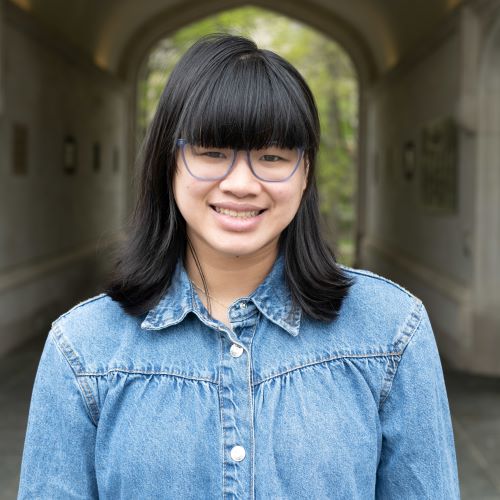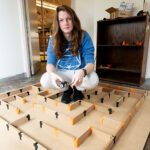
‘Overlooked Adoptees’ I.S. research earns Equity, Diversity, and Inclusion Award at the Senior Research Symposium

Zoe Seymore ’23 grew up in Texas after being adopted from China when she was 11 months old. The adoption community has always been an important part of her life. When she decided to attend The College of Wooster, she knew she would leave behind her state’s big universities and instead safely pack up her important Chinese transracial adoptee identity and take it with her to Ohio.
She chose Wooster because of its size and its focus on research. She thoroughly enjoyed her AP capstone research project in high school about adoption children’s books’ impact on identity and wanted to continue research along the same vein in college.
During her sophomore year, the psychology major became a research assistant for Ziying You, associate professor of Chinese Studies, East Asian Studies, and Women’s, Gender, & Sexuality Studies. Seymore helped identify participants for the research You was doing about how the COVID-19 pandemic impacted Chinese women in the United States. Working on You’s project helped Seymore solidify that she wanted to focus her I.S. on the COVID-19 pandemic and Chinese adoptees.
“I have found my way toward the mental health sector and plan to do clinical work with adoptees and Asian Americans. There are a lot of stigmas in the Asian American community, so I hope having an Asian American therapist will help.”
—Zoe Seymore ’23, I.S. title: Overlooked Adoptees: The Effects of COVID-19 Racism and Ethnic Identity on the Psychological Well-Being of Chinese Transracial adoptees in the United States
According to Seymore, previous research has shown how Asian Americans, in general, experienced discrimination during the peak of the COVID-19 pandemic and how the discrimination impacted their mental health. For her I.S. research, Seymore focused on how perceived discrimination during the pandemic and ethnic identity impacted the psychological well-being of Chinese transracial adoptees in the United States. With the guidance of her I.S. mentor, Amber Garcia, professor of psychology and department chair, Seymore hypothesized that high levels of perceived discrimination and stronger ethnic and adoptee identity would lead to lower psychological well-being.
Because of her strong connection to the adoptee community, she was very excited to do the research. “I’m very involved in the adoption community in terms of keeping up with the news, sharing my experiences, raising awareness, and advocating for the community,” she said. She helped to organize the March for Asian Lives protest on campus in spring 2021, and with the help of a friend, founded Wooster Adoptee Student Union.
Seymore conducted 26 interviews with adult Chinese adoptees in the U.S., asking about their experiences during the pandemic. She questioned them about any financial changes, experiences of racism and discrimination and hopes for the future. She measured psychological well-being as a collective-measure and as a self-measure—how they identified as part of their social group and how they self-identified. Connection to Chinese identity and culture, connection to adoptee identity, reactions to the pandemic, and discrimination were the themes that came out of the interviews. Participants also took a survey related to personal self-esteem, collective self-esteem, perceived prejudice, and adoptee identity.
She found that ethnic identity and perceived discrimination were not significant predictors of psychological well-being in adoptees. “It was interesting, when those measures were combined, it did not support my hypothesis; however, when one of the measures was separated it did support my hypothesis,” Seymore said. Ethnic identity and perceived discrimination impacted collective self-esteem but not the full measure of psychological well-being.
“The adoptee experience is so unique, it’s hard to translate it into numbers,” she said. She thinks adoptees might relate more to the social groups they belong to, so when looking at just the social group it might have more impact on well-being than looking at the individual. “I know for me personally, with the anti-Asian racism incidents during the pandemic, I felt a stronger connection to the Asian-American community even though I was raised by white parents,” Seymore said.
She earned an Equity, Diversity, and Inclusion Award for her I.S. research during the 2023 Senior Research Symposium. The project meant a lot to her. “I hope that people read it and learn from it. I hope it leaves some kind of impact somewhere,” she said.
She was awarded a Fulbright to teach in Taiwan, which means pursuing graduate degrees to go into clinical work will have to wait. As a Fulbright English teaching assistant, Seymore looks forward to traveling, improving her Chinese language skills, and being immersed in the culture. “I just feel a connection when I’m in that part of the world,” she said. Eventually, she hopes to focus her psychology work on adoptees research. She said there is not as much research on adult adoptees’ experiences as there is research to help adoptive parents to talk to their children about adoption or integrate heritage into their lives. “I have found my way toward the mental health sector and plan to do clinical work with adoptees and Asian Americans. There are a lot of stigmas in the Asian American community, so I hope having an Asian American therapist will help,” she said.
Posted in Independent Study on May 19, 2023.
Related Posts
Related Areas of Study
Psychology
Do research, work with faculty mentors, and tailor a psychology program to your interests
Major Minor

